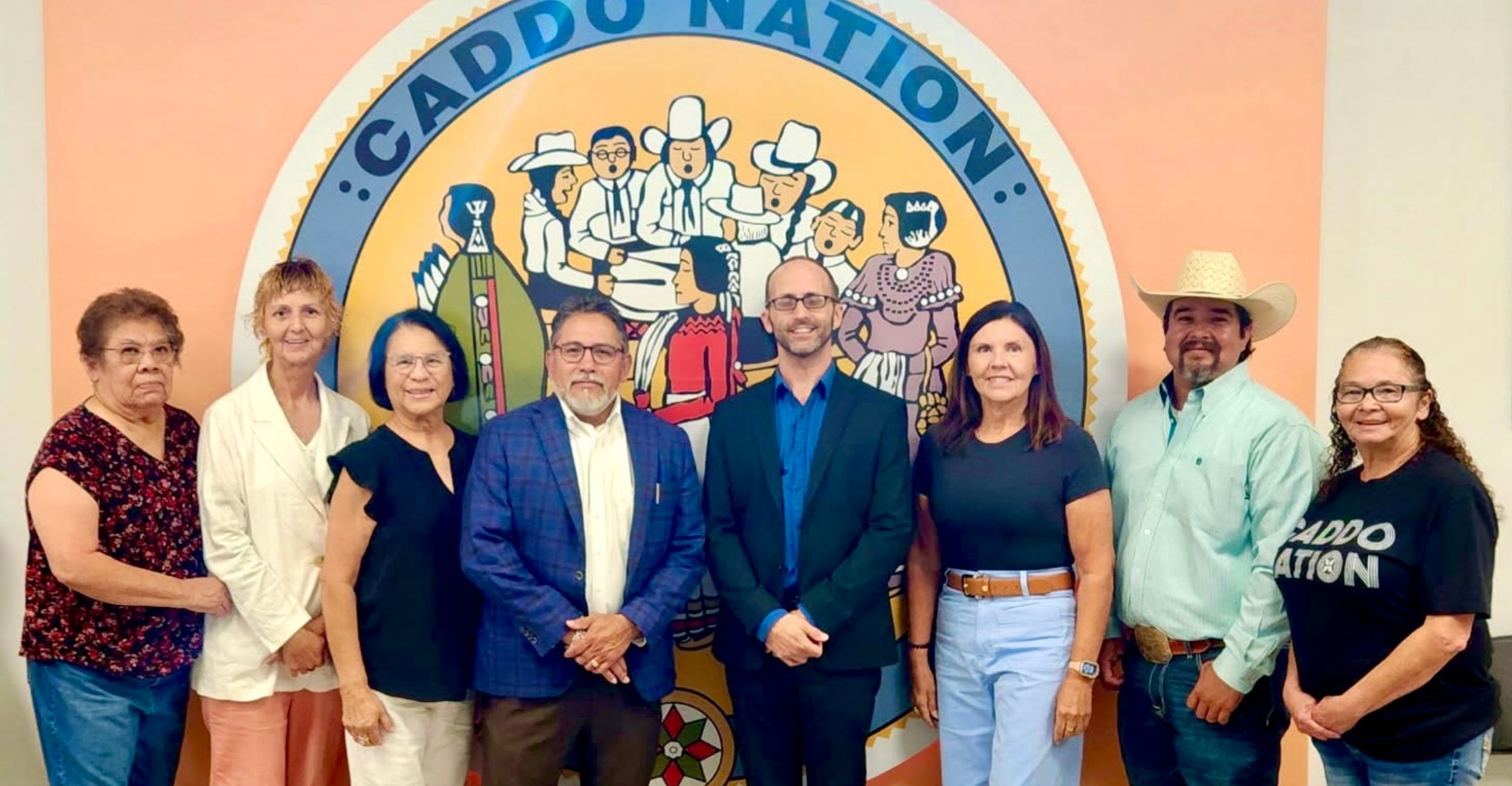Media Contact: Brandon Dinsmore | Workforce and Economic Development | 918-293-4983 | brandon.dinsmore@okstate.edu
The Caddo Nation Economic Development Authority (CNEDA) and Oklahoma State University Institute of Technology have entered into a historic Memorandum of Understanding to create innovative workforce development opportunities for Caddo citizens and strengthen the tribal economy through strategic educational partnerships.
Signed by CNEDA Chairman Bobby Gonzalez and OSUIT Vice Provost Trey Hill, this agreement establishes a comprehensive framework for customized training programs aligned with the Caddo Nation’s expanding tribal enterprises, including renewable energy, construction, and infrastructure development.
“This partnership represents a transformative milestone for our Nation,” said Bobby Gonzalez, chairman of the Caddo Nation. “By collaborating with OSUIT, we are not only creating employment opportunities but also laying the groundwork for long-term prosperity and economic independence for future generations.”
The initiative supports the implementation of the Caddo Nation’s Section 477 Plan and Resiliency Plan, offering scalable pathways for tribal members to engage in, lead, and expand the nation’s economic initiatives.
Key sectors targeted by the partnership include:
Renewable Energy Development — supporting the SAKU solar initiative and other green energy ventures.
Construction and Infrastructure — preparing workers for tribal and regional construction projects.
Environmental Remediation — training specialists for orphan well cleanup and environmental restoration.
Utility Development — developing expertise in energy infrastructure and grid modernization.
“This agreement reflects OSUIT’s dedication to serving Oklahoma’s diverse communities,” Dr. Hill stated. “Our industry-aligned programs and advanced facilities offer an ideal platform for preparing Caddo citizens for high-paying careers in these fast-growing industries.”
Under the agreement, OSUIT will deliver customized non-credit training programs, industry certifications, faculty support, and access to state-of-the-art facilities at its Okmulgee campus. CNEDA will manage facilities, coordinate recruitment, and ensure alignment with the tribe’s enterprise development strategy.
The partnership builds on the Caddo Nation’s strong record of economic growth and diversification through Caddo Enterprises, which includes retail operations, the SAKU renewable energy division, and infrastructure development projects.
“This MOU reflects the strategic vision that positions tribal nations as key players in the modern economy,” said Zackeree Kelin, vice-chairman of CNEDA. “We are establishing a direct link from education to economic opportunity, ensuring our citizens have the skills to build both careers and the future of our Nation.”
The agreement includes provisions for joint marketing, quality assurance, and long-term sustainability of the training programs.
About the Caddo Nation
The Caddo Nation is a federally recognized tribe headquartered in Binger, Oklahoma, with more than 7,000 enrolled members. Through its Economic Development Authority and diverse business portfolio, the tribe has become a leader in tribal economic development, renewable energy, and community resilience planning. Recent collaborations, such as the University of Oklahoma’s RANGE project and the first Native Renewable Energy Symposium, highlight its commitment to energy sovereignty and inter-tribal cooperation.
About Oklahoma State University Institute of Technology
OSU Institute of Technology is Oklahoma’s premier institution for applied technical education, offering hands-on, skills-based training tailored to current industry needs. Established in 1946, OSUIT is part of the OSU Polytech initiative focused on workforce development. As part of Oklahoma State University’s land-grant mission, OSUIT delivers world-class polytechnic programs through an industry-aligned, practical approach. With strong industry partnerships and a focus on real-world experience, OSUIT equips graduates with the skills and credentials to succeed in high-demand technical fields.
Implementation Timeline
Implementation of the partnership will begin immediately, with the first customized training programs scheduled to launch in fall 2025. The agreement is valid through June 30, 2026, with options for annual renewal and expansion based on program success and community needs.
